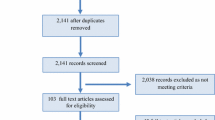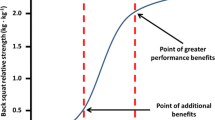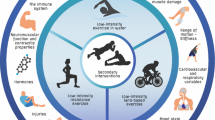Abstract
Theoretical and methodological aspects of self-efficacy theory are assessed in this study, and the tennis performance of 40 active players (M age = 26.6 years) serves as the criterion variable. On a theoretical level, only self-efficacy beliefs, and not response-outcome expectations or the valence thereof, were consistently and significantly related to 12 dimensions of tennis performance. This phenomenon pertained to the relationship of the self-rating of performance as well as to the average of two judges' external ratings of performance and efficacy beliefs, even though the 12 behavioral criteria used were different from the items on the self-efficacy scale. Although Pearson correlations rather than microanalyses were computed to assess the relationship between self-efficacy and performance, the correlations were all positive and significant. Theoretical and empirical implications are suggested.
Similar content being viewed by others
Reference Notes
Patz, M., & Barling, J.Self-efficacy versus valence expectancy theories of scholastic performance. Unpublished manuscript, University of the Witwatersrand, 1981.
Barling, J., & Bresgi, B.Self-efficacy beliefs and scholastic performance: Cause or reflection of behavioral change? Unpublished manuscript, University of the Witwatersrand, 1980.
References
Advances in Behaviour Research and Therapy, 1978,1(4), 137–269.
Bandura, A. Self-efficacy: Toward a unifying theory of behavior change.Psychological Review 1977,84 191–215.
Bandura, A. Gauging the relationship between self-efficacy judgment and action.Cognitive Therapy and Research 1980,4 263–268.
Bandura, A., & Adams, N. E. Analysis of self-efficacy theory of behavior change.Cognitive Therapy and Research 1977,1 287–308.
Bandura, A., Adams, N. E., & Bayer, J. A cognitive mechanism mediating behavioral change.Journal of Personality and Social Psychology 1977,35 125–139.
Bandura, A., Adams, N. E., Hardy, A. B., & Howells, G. N. Tests of the generality of self-efficacy theory.Cognitive Therapy and Research 1980,4 39–66.
Barling, J., & Beattie, R. Self-efficacy beliefs and insurance sales performance.Journal of Organizational Behavior Management, 1983, in press.
Gravel, R., Lemieux, G., & Ledouceur, R. Effectiveness of a cognitive behavioral treatment package for cross-country ski racers.Cognitive Therapy and Research 1980,4 83–90.
Horowitz, L. M., Inouye, D., & Siegelman, E. T. On averaging judges' ratings to increase their correlation with an external criterion.Journal of Consulting and Clinical Psychology 1979,47 453–458.
Kazdin, A. E. Conceptual and assessment issues raised by self-efficacy theory.Advances in Behaviour Research and Therapy 1978,1(4), 177–186.
Kazdin, A. E. Imagery elaboration and self-efficacy in the covert modeling treatment of assertive behavior.Journal of Consulting and Clinical Psychology 1979,47 725–753.
Kazdin, A. E. Covert and overt rehearsal and elaboration during treatment in the development of assertive behavior.Behaviour Research and Therapy 1980,18 191–201.
Kazdin, A. E., & Rogers, T. On paradigms and recycled ideologies: Analogue research revisited.Cognitive Therapy and Research 1978,2 105–117.
Kendall, P. C., & Korgeski, G. P. Assessment and cognitive behavioral interventions.Cognitive Therapy and Research 1979,3 1–21.
Keyser, V., & Barling, J. Assessing the determinants of children's academic self-efficacy beliefs.Cognitive Therapy and Research 1981,5 29–39.
Kirsch, I. “Microanalytic” analyses of efficacy expectations as predictors of performance.Cognitive Therapy and Research 1980,4 259–262.
Mahoney, M. J. Cognitive skills and athletic performance. In P. C. Kendall & S. C. Hollon (Eds.),Cognitive behavioral interventions: Theory, research and procedures. New York: Academic Press, 1979.
National Tennis Rating Program. Find out how you rate on the tennis scale.Magazine of Racquet Sports, 1 May 1979.
Woolfolk, R. L., & Lazarus, A. A. Between laboratory and clinic: Paving the two-way street.Cognitive Therapy and Research 1979,3 239–244.
Author information
Authors and Affiliations
Rights and permissions
About this article
Cite this article
Barling, J., Abel, M. Self-efficacy beliefs and tennis performance. Cogn Ther Res 7, 265–272 (1983). https://doi.org/10.1007/BF01205140
Issue Date:
DOI: https://doi.org/10.1007/BF01205140




